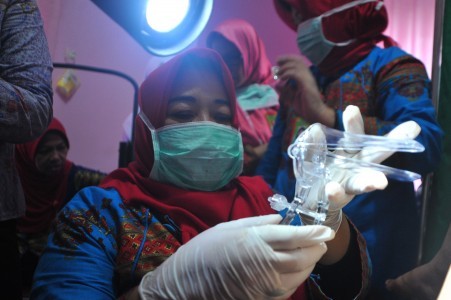Indonesia’s cervical cancer-free future: How it is possible
In Indonesia, cervical cancer is the second leading cause of cancer death in women.
Change text size
Gift Premium Articles
to Anyone

D
ue to its huge impact on quality of life, cervical cancer has become a major public health threat countries aim to eliminate by 2030. Like other cancers, cervical cancer can be detected early and treated successfully.
Yet, it remains the fourth most common cancer in women globally, with an estimated 604,000 new cases and 342,000 deaths in 2020. Around 90 percent of new cases and deaths were reported in low- and middle-income countries, World Health Organization data show.
In Indonesia, cervical cancer is the second leading cause of cancer death in women. According to GLOBOCAN 2020 data, more than 36,600 new cases of cervical cancer were recorded in 2020, or 17.2 percent of over 213,500 new cancer cases in females. Cervical cancer, the main type of cancer linked to human papillomavirus (HPV), killed 21,003 women in 2020, which means 57 women die of cervical cancer every day in Indonesia. Without sufficient preventive measures, the cervical cancer death rate may increase by 50 percent in 2030.
Showing the urgency to fight cervical cancer, the health minister recently issued a decree on the expansion of the HPV immunization program. Under this new regulation, it is likely that the government will soon roll out a mandatory HPV vaccination program nationwide.
During a work meeting with members of House of Representatives Commission IX, which oversees health affairs, on Jan. 25, Health Minister Budi Gunadi Sadikin confirmed HPV immunization would be made mandatory.
According to Budi, the HPV vaccine is a lot cheaper than medical expenses of cervical cancer treatment. The HPV vaccine is one of three new vaccines included in the national immunization program this year, apart from the pneumococcal conjugate vaccine (PCV) for childhood pneumonia prevention and the rotavirus vaccine as a diarrhea intervention.
Despite the COVID-19 burden, the government has been widely praised for striving to achieve its cervical cancer elimination goal by 2030. The Health Ministry’s attempt to expand its HPV immunization demonstration project for school children in 2022 evinces this commitment.
Since the project kicked off in 2017, the HPV vaccination program has been included in Schoolchildren Immunization Month (BIAS), in which the first vaccine shot is administered in the fifth grade at elementary schools, followed by the second shot in the sixth grade. This program is accompanied with the government’s efforts to increase the coverage of cervical cancer screening with acetic acid visual inspection (IVA) tests. A combination test with HPV DNA is being proposed to the government.
Prof. Andrijono, an oncology-gynecology consultant from Cipto Mangunkusumo General Hospital, said cervical cancer was preventable and curable as long as it was detected early and managed properly. An early diagnosed cancer will also reduce the burden of health costs, because treatment at the level of pre-cancerous lesions will cost less, he said.
“Unfortunately, most of the patients see the doctor when the cancerous lesions have reached an advanced stage,” Andrijono, chairman of the oncology division at the Indonesian Society of Obstetrics and Gynecology (POGI), told The Jakarta Post on Jan. 21.
During the global virtual screening of Conquering Cancer, a documentary on cervical cancer elimination, on Jan. 11, he underlined the importance of early cancer detection. The screening was hosted by Roche Diagnostics Asia Pacific in conjunction with Cervical Cancer Awareness Month in January.
Conquering Cancer highlights the urgent need to formalize national guidelines on cervical cancer elimination, provide appropriate access to prevention and treatment measures and empower women to take care of their cervical health.
In November 2020, the WHO launched a global strategy to eliminate cervical cancer by 2030, which advocates an integrated strategy of vaccination, testing and access to treatment. Following up this global strategy, Asia-Pacific Economic Cooperation (APEC) economies have endorsed a road map to work toward the same goal. National guidelines play a crucial role in ensuring that all people have equal access to vaccination and screening.
It is good to see that Indonesia has a medical service national guideline (PNPK) for cervical cancer management, which was issued by the Health Ministry in 2018. The PNPK mandates screening tests for all, which are available at community health centers (Puskesmas). All married and sexually active women are advised to take screening tests after three years of marriage and repeat the procedure once in every three years until they reach 55.
The government has also used a lot of resources to fight cervical cancer by building complete facilities at national referral hospitals. They include clinical pathology and anatomical pathology laboratories, surgery rooms and radiotherapy facilities, where medical workers can perform comprehensive diagnosis and therapy processes for cervical cancer patients.
The national health insurance (JKN) program, which is managed by the Health Care and Social Security Agency (BPJS Kesehatan), can be considered another breakthrough because it can fully cover the medical expenses of patients diagnosed with cervical cancer. The problem is, BPJS does not cover accommodation costs patients must pay when they undergo treatment for quite a long time.
This shows that prevention is better than cure. A lack of knowledge and poor awareness about the danger of cervical cancer and HPV infection are among the biggest contributing factors to Indonesia’s high prevalence of cervical cancer that the government needs to quickly address. Primary prevention through HPV immunization may bring significant results to the country’s bid to eliminate cervical cancer and our support matters.
World Cancer Day, which falls on Feb. 4 every year, could be a perfect opportunity for all parties to strengthen their commitment to the fight against cervical cancer. The steady rise in the number of new cases and deaths shows that despite the remarkable progress, our battle against cervical cancer is far from over.
***
The author is a staff writer at The Jakarta Post.









